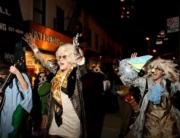
The Vilna Resistance, as seen in Resistance: They Fought Back (Ghetto Fighters’ House Museum/Abramorama)
During their short-lived, but monstrous regime, the Nazis operated on two immoral goals: to conquer the world and murder all the Jews. By the end of World War II, one of those goals was all but lost, which only further drove them to speed up the Holocaust’s six million-plus death count. As professor Michael Berenbaum points out near the end of Resistance: They Fought Back, the Nazis were willing to kill Jews at the cost of depleting the war effort’s resources, presumably thinking those deaths would vindicate the Third Reich in defeat.
However, Jewish resistance, in any form, confounded the Nazis as much as it infuriated them. Acts of defiance took multiple forms to meet that era’s horrific circumstances. To help others prosper in ghettos meant to resist the Nazis. To write about what people saw in the concentration camps meant to resist. And yes, so too was armed combat. Resistance is a tribute to those who risked everything as well as a radical pushback against misconceptions that Jews accepted their fate in ignorance or without a struggle. On the contrary, they gave the Nazis hell.
Directed by Paula S. Apsell and Kirk Wolfinger, this documentary assembles a timeline across multiple countries that quickly found themselves under the Nazi’s heel once World War II began. From Lithuania to Belarus, nowhere in Europe was safe. Yet Jewish communities refused to break. A combination of testimonies—ranging from survivors and resistance fighter interviews to recovered letters and testimonies by resistance leaders—pieces together the lengths they went to fight back, especially as the true horrors of Hitler’s plans became more evident. Paralleling these insights are excavations by the late archeologist Richard Freund to match the survivors’ stories with artifacts and evidence. All of which not only help preserve their memories, but spotlight the depths of their moral courage across a wide spectrum of resistance tactics. (Freund gave Apsell the idea for this film, to whom it is dedicated.)
Some acts were as daring as smuggling a young girl out of a ghetto in a sack of potatoes, others as quietly selfless as an orphanage leader accompanying his kids to their final moments. Eventually, Resistance makes its way to the war’s final years, exploring small but significant pockets of rebellion against the concentration camps. Not all tactics were guaranteed to have any long-term impact. Yet as interviewees reiterate time and again, not going quietly was enough to prove one’s resilience.
Others risked it all while incognito. Such was the tale of Bela Hazan, a Polish Jew who served as a resistance courier in Belarus under the Nazis’ noses—literally working in a Gestapo office—thanks to her Gentile features. Hazan survived the Holocaust, but she, along with a fellow courier, were arrested, tortured, and sent to Auschwitz (albeit as a Polish prisoner, not a Jewish one), and she continued to assist survivors as a nurse within the camp until World War II’s final days. Every day, individuals such as Hazan made calculated, perilous gestures that, however small they seem in the larger context of the war, saved lives. Or at least as many lives as possible.
Cinema tends to love framing resistance as spectacle, be it a shootout or a valiant protest march against injustice. But Resistance: They Fought Back is at its best when showcasing the quiet, almost mundane choices by individuals who never asked for this life but, when faced with the Nazis’ cruelty, stepped up anyway. This documentary not only gives them a much-needed voice, it allows their deeds to embody the words bestowed onto Oskar Schindler in Schindler’s List: “He who saves one life saves the world entire.”






Leave A Comment